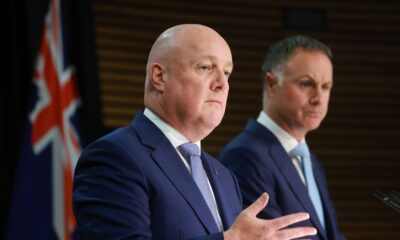Top Stories
Government Reports $9.3 Billion Deficit, Finance Minister Highlights Progress

The government has concluded the financial year with a deficit of $9.3 billion, which, while lower than anticipated, still reflects ongoing fiscal challenges. According to Treasury figures, this deficit represents an increase of $533 million from the previous year ending in June 2024, but is $869 million less than what was projected in the May budget. This figure is derived from a new calculation method that excludes costs related to the Accident Compensation Corporation (ACC).
Finance Minister Nicola Willis expressed optimism regarding the financial management, stating that the figures demonstrate significant progress in restoring fiscal discipline. “This progress reflects the government’s ongoing work to restore fiscal discipline with cumulative savings of around $44 billion being delivered over the government’s first two Budgets,” she stated. These savings have been allocated towards essential sectors such as health, education, police, and defence, while also providing tax relief and funding the Investment Boost programme introduced in the budget.
The government has faced pressure to implement more aggressive cuts in expenditure. However, Willis defended a more measured approach, citing international evidence that suggests gradual deficit reduction yields better long-term results. The May budget projected a steady decline in the deficit, with expectations of achieving a surplus by 2028/29. Updated forecasts will be available in the half-year economic and fiscal update (HYEFU) scheduled for December 16, 2024.
Tax Revenue Increases and Spending Trends
Despite the deficit, key fiscal indicators are showing signs of improvement. The tax revenue has exceeded expectations, totaling $121 billion—an increase of $900 million compared to forecasts. This rise is attributed to higher collections from goods and services tax (GST), corporate tax, provisional tax, and employee PAYE, although some of these gains were offset due to adjustments in tax thresholds.
The three majority state-owned power companies—Genesis, Meridian, and Mercury—contributed to a $1 billion increase in Crown sales revenue, primarily driven by elevated wholesale power prices. Meanwhile, total government expenses rose by nearly 2% to $183.5 billion compared to the previous year, yet remained approximately $610 million below the budget forecast. Much of this expense increase is attributed to rising superannuation and welfare costs, partially mitigated by reductions in other areas.
Treasury noted that this increase in expenses marks the lowest rate of growth since 2021, suggesting a potential shift in fiscal management moving forward. As the government prepares for the upcoming update in December, the focus will likely remain on balancing budgetary needs with commitments to essential public services.
-

 Top Stories1 month ago
Top Stories1 month agoCommunity Mourns Teens Lost in Mount Maunganui Landslide
-

 Entertainment6 months ago
Entertainment6 months agoTributes Pour In for Lachlan Rofe, Reality Star, Dead at 47
-

 World3 months ago
World3 months agoPrivate Funeral Held for Dean Field and His Three Children
-

 Top Stories3 months ago
Top Stories3 months agoFuneral Planned for Field Siblings After Tragic House Fire
-

 Sports6 months ago
Sports6 months agoNetball New Zealand Stands Down Dame Noeline Taurua for Series
-

 Entertainment1 month ago
Entertainment1 month agoJulian Dennison Ties the Knot with Christian Baledrokadroka in New Zealand
-

 Entertainment5 months ago
Entertainment5 months agoNew ‘Maverick’ Chaser Joins Beat the Chasers Season Finale
-

 Sports6 months ago
Sports6 months agoSilver Ferns Legend Laura Langman Criticizes Team’s Attitude
-

 Sports4 months ago
Sports4 months agoEli Katoa Rushed to Hospital After Sideline Incident During Match
-

 Sports4 months ago
Sports4 months agoAll Blacks Star Damian McKenzie and Partner Announce Baby News
-

 Sports3 months ago
Sports3 months agoNathan Williamson’s Condition Improves Following Race Fall
-

 Politics5 months ago
Politics5 months agoNetball NZ Calls for Respect Amid Dame Taurua’s Standoff





















